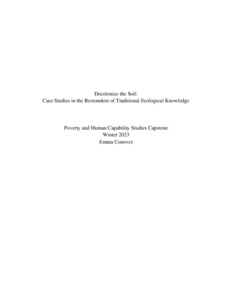| dc.rights.license | In Copyright | en_US |
| dc.creator | Conover, Emma | |
| dc.date.accessioned | 2023-09-06T11:55:53Z | |
| dc.date.available | 2023-09-06T11:55:53Z | |
| dc.date.created | 2023 | |
| dc.identifier | WLURG038_Conover_POV_2023 | |
| dc.identifier.uri | https://dspace.wlu.edu/handle/11021/36230 | |
| dc.description | Capstone; [FULL-TEXT AVAILABLE] | en_US |
| dc.description | Emma Conover is a member of the Class of 2024 of Washington and Lee University. | en_US |
| dc.description.abstract | Because of rich environmental, linguistic, and cultural history and culture, NGOs and government agencies in Latin America have been studying and implementing cultural knowledge restoration for decades. This investigation aims to measure the efficacy in implementation of these systems, and suggests how future projects could be better executed. Traditional Ecological Knowledge (TEK) is the generalized field of study regarding implementation of cultural knowledge. . . . Decimation of cultural knowledge, traditions, and peoples is also a poverty related issue. Traditional economic systems in the Andes have been replaced by a globalized, capitalistic model, where indigenous communities typically lack sovereignty over their assets. Assets not only include businesses and investments, but social capital, environment, and cultural institutions. In Latin America, indigenous peoples are twice as likely to experience poverty than those who identify as mestizo. Indigenous peoples are also substantially more likely to feel adverse effects of climate change, making global warming a significant social determinant of health for indigenous populations (Lines, 2019). The efficacy of traditional ecological knowledge is of pressing importance, if it can be proven to serve as a means of protection for land and people. This paper focuses on two case studies of examples of attempted restoration of cultural knowledge through agricultural practices; raised agricultural beds in Peru and potato agriculture. The efficacy of these projects are expressed in the analysis section by the metrics of longevity, externalities, agricultural production, and social effects. In conjunction with measures of adherence to locally-led development, this paper will aim to measure how well these development standards can account for project efficacy. [From Introduction] | en_US |
| dc.format.extent | 30 pages | en_US |
| dc.language.iso | en_US | en_US |
| dc.rights | This material is made available for use in research, teaching, and private study, pursuant to U.S. Copyright law. The user assumes full responsibility for any use of the materials, including but not limited to, infringement of copyright and publication rights of reproduced materials. Any materials used should be fully credited with the source. | en_US |
| dc.rights.uri | http://rightsstatements.org/vocab/InC/1.0/ | en_US |
| dc.subject.other | Washington and Lee University, Shepherd Poverty Program | en_US |
| dc.title | Decolonize the Soil: Case Studies in the Restoration of Traditional Ecological Knowledge | en_US |
| dc.type | Text | en_US |
| dcterms.isPartOf | RG38 - Student Papers | en_US |
| dc.rights.holder | Conover, Emma | |
| dc.subject.fast | Traditional ecological knowledge | en_US |
| dc.subject.fast | Decolonization | en_US |
| dc.subject.fast | Group identity | en_US |
| local.embargo.terms | | en_US |
| local.department | Shepherd Poverty Program | en_US |
| local.scholarshiptype | Capstone | en_US |
